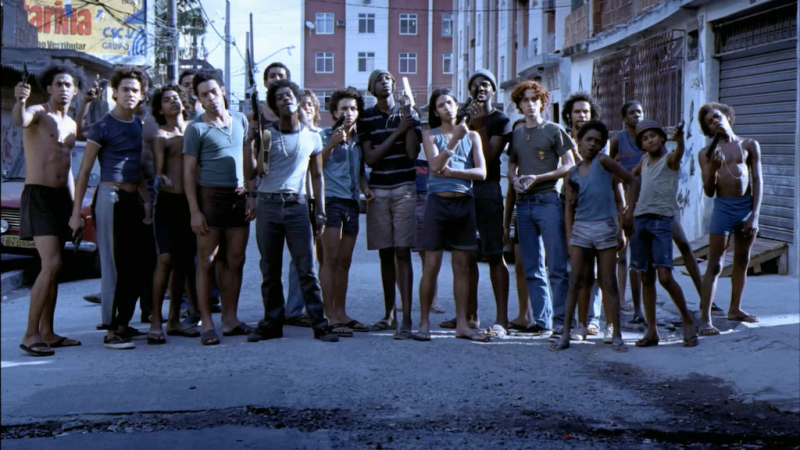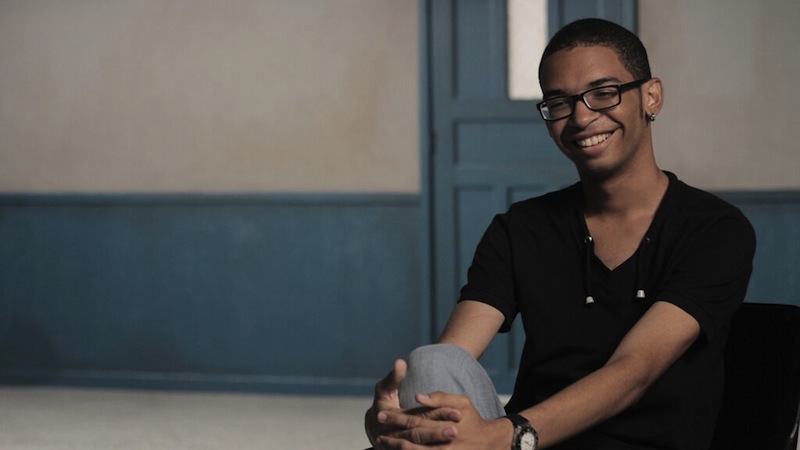Rio+Film, Barbican | reviews, news & interviews
Rio+Film, Barbican
Rio+Film, Barbican
Diverse films gave a glimpse beyond the tourist veneer of Brazil's cultural capital

With eyes trained on sporty Rio de Janeiro once more for next year’s Olympic Games, cultural portals on to the city are bound to be offered in all sorts of places around the world. One such is Rio+Film, a new film festival at the Barbican Centre focusing exclusively on the great Brazilian city by the sea. Rio+Film is likely to have further editions elsewhere.
Curator Adriana Rouanet says the “+” in the festival’s name underlines that the chosen films burrow beneath the usual image of beach, football and carnival. In the Saturday-night hot spot was Fernando Meirelles’ and Kátia Lund’s 2002 Cidade de Deus (City of God). One of the most successful Brazilian films of the past 20 years, along with Walter Salles’ Central do Brasil (Central Station), this favela nasty shows little of the Rio that most travellers to the games will be allowed to get close to.

Rosa (Leandra Leal), in her mid-20s, is picked up by the older Bernardo (Milhem Cortaz, pictured above left, with Leal), a rail and bus inspector. They have an affair, well after the film’s crime starting-point: the abduction from primary school of Bernardo and his wife Sylvia’s daughter Clarinha. There are, then, several flashbacks, the biggest being the arrested Rosa’s confession to a police officer, which becomes the film’s main narrative.

Bernardo finds himself up against a young woman of fierce amorous intensity and feminist enlightenment. What Rosa does, eventually, is practically as shocking as all those murderous scenes in Cidade de Deus put together. Up to a point, because of what’s done to her, we are with her, but… O lobo atrás da porta is, in my view, a much more enjoyable film: taut, atmospheric, deeply unsettling.
Eduardo Coutinho was one of Brazil’s signal documentary-makers. He was murdered by (it is thought) his paranoid-schizophrenic son in February 2014. He had filmed an odd assortment of interviews with teenage cariocas (natives of Rio) before his death, aged 80. More mad stuff from Rio? The opening 15 minutes of Últimas conversas (Last Conversations, pictured above) might suggest so: Coutinho in an unwitting, melancholy last stand, rambling on about his inability to live on without making films, followed by his interviews with dreamy, troubled youngsters. Yet the film – simple format, simple conversations in a bare room – works extraordinarily well. Coutinho had something, and ends his charming inquisition on a note that leaves you singing.

A música segundo Tom Jobim (The Music According to Antonio Carlos Jobim, the film’s official English title) is a joy for lovers of the bossa nova and the genius – Jobim – who invented it, but a tough ask for anyone more glancingly interested in Brazil’s most enduring international music idiom. This is a montage of footage of the man himself and many others (Sinatra, Sammy Davies, Garland, Gillespie: the cast is huge). There is no narrative and no subtitling. The story is as complex as that of rock’n’roll from The Beatles to Prince. So when Vinícius de Moraes and Nara Leão and Elis Regina also appear, the temptation is to leap up and beg Ms Rouanet and her team, or someone, to provide on-screen help with identifying these remarkable Brazilians. Luckily, the quality of the songs and playing speaks for itself.
The future of Arts Journalism
You can stop theartsdesk.com closing!
We urgently need financing to survive. Our fundraising drive has thus far raised £49,000 but we need to reach £100,000 or we will be forced to close. Please contribute here: https://gofund.me/c3f6033d
And if you can forward this information to anyone who might assist, we’d be grateful.

Subscribe to theartsdesk.com
Thank you for continuing to read our work on theartsdesk.com. For unlimited access to every article in its entirety, including our archive of more than 15,000 pieces, we're asking for £5 per month or £40 per year. We feel it's a very good deal, and hope you do too.
To take a subscription now simply click here.
And if you're looking for that extra gift for a friend or family member, why not treat them to a theartsdesk.com gift subscription?
more Film
 The Mastermind review - another slim but nourishing slice of Americana from Kelly Reichardt
Josh O'Connor is perfect casting as a cocky middle-class American adrift in the 1970s
The Mastermind review - another slim but nourishing slice of Americana from Kelly Reichardt
Josh O'Connor is perfect casting as a cocky middle-class American adrift in the 1970s
 Springsteen: Deliver Me From Nowhere review - the story of the Boss who isn't boss of his own head
A brooding trip on the Bruce Springsteen highway of hard knocks
Springsteen: Deliver Me From Nowhere review - the story of the Boss who isn't boss of his own head
A brooding trip on the Bruce Springsteen highway of hard knocks
 The Perfect Neighbor, Netflix review - Florida found-footage documentary is a harrowing watch
Sundance winner chronicles a death that should have been prevented
The Perfect Neighbor, Netflix review - Florida found-footage documentary is a harrowing watch
Sundance winner chronicles a death that should have been prevented
 Blu-ray: Le Quai des Brumes
Love twinkles in the gloom of Marcel Carné’s fogbound French poetic realist classic
Blu-ray: Le Quai des Brumes
Love twinkles in the gloom of Marcel Carné’s fogbound French poetic realist classic
 Frankenstein review - the Prometheus of the charnel house
Guillermo del Toro is fitfully inspired, but often lost in long-held ambitions
Frankenstein review - the Prometheus of the charnel house
Guillermo del Toro is fitfully inspired, but often lost in long-held ambitions
 London Film Festival 2025 - a Korean masterclass in black comedy and a Camus classic effectively realised
New films from Park Chan-wook, Gianfranco Rosi, François Ozon, Ildikó Enyedi and more
London Film Festival 2025 - a Korean masterclass in black comedy and a Camus classic effectively realised
New films from Park Chan-wook, Gianfranco Rosi, François Ozon, Ildikó Enyedi and more
 After the Hunt review - muddled #MeToo provocation
Julia Roberts excels despite misfiring drama
After the Hunt review - muddled #MeToo provocation
Julia Roberts excels despite misfiring drama
 London Film Festival 2025 - Bradley Cooper channels John Bishop, the Boss goes to Nebraska, and a French pandemic
... not to mention Kristen Stewart's directing debut and a punchy prison drama
London Film Festival 2025 - Bradley Cooper channels John Bishop, the Boss goes to Nebraska, and a French pandemic
... not to mention Kristen Stewart's directing debut and a punchy prison drama
 Ballad of a Small Player review - Colin Farrell's all in as a gambler down on his luck
Conclave director Edward Berger swaps the Vatican for Asia's sin city
Ballad of a Small Player review - Colin Farrell's all in as a gambler down on his luck
Conclave director Edward Berger swaps the Vatican for Asia's sin city
 London Film Festival 2025 - from paranoia in Brazil and Iran, to light relief in New York and Tuscany
'Jay Kelly' disappoints, 'It Was Just an Accident' doesn't
London Film Festival 2025 - from paranoia in Brazil and Iran, to light relief in New York and Tuscany
'Jay Kelly' disappoints, 'It Was Just an Accident' doesn't
 Iron Ladies review - working-class heroines of the Miners' Strike
Documentary salutes the staunch women who fought Thatcher's pit closures
Iron Ladies review - working-class heroines of the Miners' Strike
Documentary salutes the staunch women who fought Thatcher's pit closures
 Blu-ray: The Man in the White Suit
Ealing Studios' prescient black comedy, as sharp as ever
Blu-ray: The Man in the White Suit
Ealing Studios' prescient black comedy, as sharp as ever

Add comment